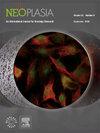通过Chk1抑制胰腺癌干细胞对吉西他滨的增敏。
IF 7.7
2区 医学
Q1 ONCOLOGY
引用次数: 88
摘要
检查点激酶1 (Chk1)抑制使胰腺癌细胞和肿瘤对吉西他滨敏感。我们假设Chk1抑制会使胰腺癌干细胞对吉西他滨敏感。我们通过使用两种患者来源的异种移植模型(指定为J和F)和胰腺癌干细胞标记物CD24、CD44和ESA来验证这一假设。在用吉西他滨和Chk1抑制剂AZD7762治疗后,我们测定了标记阳性细胞的百分比及其肿瘤启动能力(通过限制稀释试验)。我们发现吉西他滨和AZD7762联合使用显著减少了标记阳性细胞。此外,与对照组、吉西他滨或AZD7762单独治疗相比,吉西他滨+ AZD7762治疗原发性肿瘤的继发性肿瘤发生明显延迟。此外,从吉西他滨-与吉西他滨+ azd7762治疗的原发肿瘤中植入相同数量的干细胞,10周时继发肿瘤起始率分别为83%和43%。我们还发现pS345 Chk1(一种DNA损伤的测量方法)在标记阳性细胞中被诱导,而在标记阴性细胞中则没有。这些数据表明,Chk1抑制联合吉西他滨可降低胰腺癌干细胞的百分比和肿瘤启动能力。此外,研究发现Chk1介导的DNA损伤反应在干细胞中比在非干细胞中更大,这表明Chk1抑制可能选择性地使胰腺癌干细胞对吉西他滨敏感,从而使Chk1成为改善胰腺癌治疗的潜在治疗靶点。本文章由计算机程序翻译,如有差异,请以英文原文为准。
Sensitization of pancreatic cancer stem cells to gemcitabine by Chk1 inhibition.
Checkpoint kinase 1 (Chk1) inhibition sensitizes pancreatic cancer cells and tumors to gemcitabine. We hypothesized that Chk1 inhibition would sensitize pancreatic cancer stem cells to gemcitabine. We tested this hypothesis by using two patient-derived xenograft models (designated J and F) and the pancreatic cancer stem cell markers CD24, CD44, and ESA. We determined the percentage of marker-positive cells and their tumor-initiating capacity (by limiting dilution assays) after treatment with gemcitabine and the Chk1 inhibitor, AZD7762. We found that marker-positive cells were significantly reduced by the combination of gemcitabine and AZD7762. In addition, secondary tumor initiation was significantly delayed in response to primary tumor treatment with gemcitabine + AZD7762 compared with control, gemcitabine, or AZD7762 alone. Furthermore, for the same number of stem cells implanted from gemcitabine- versus gemcitabine + AZD7762-treated primary tumors, secondary tumor initiation at 10 weeks was 83% versus 43%, respectively. We also found that pS345 Chk1, which is a measure of DNA damage, was induced in marker-positive cells but not in the marker-negative cells. These data demonstrate that Chk1 inhibition in combination with gemcitabine reduces both the percentage and the tumor-initiating capacity of pancreatic cancer stem cells. Furthermore, the finding that the Chk1-mediated DNA damage response was greater in stem cells than in non-stem cells suggests that Chk1 inhibition may selectively sensitize pancreatic cancer stem cells to gemcitabine, thus making Chk1 a potential therapeutic target for improving pancreatic cancer therapy.
求助全文
通过发布文献求助,成功后即可免费获取论文全文。
去求助
来源期刊

Neoplasia
ONCOLOGY-
自引率
2.10%
发文量
82
期刊介绍:
Neoplasia publishes the results of novel investigations in all areas of oncology research. The title Neoplasia was chosen to convey the journal’s breadth, which encompasses the traditional disciplines of cancer research as well as emerging fields and interdisciplinary investigations. Neoplasia is interested in studies describing new molecular and genetic findings relating to the neoplastic phenotype and in laboratory and clinical studies demonstrating creative applications of advances in the basic sciences to risk assessment, prognostic indications, detection, diagnosis, and treatment. In addition to regular Research Reports, Neoplasia also publishes Reviews and Meeting Reports. Neoplasia is committed to ensuring a thorough, fair, and rapid review and publication schedule to further its mission of serving both the scientific and clinical communities by disseminating important data and ideas in cancer research.
 求助内容:
求助内容: 应助结果提醒方式:
应助结果提醒方式:


